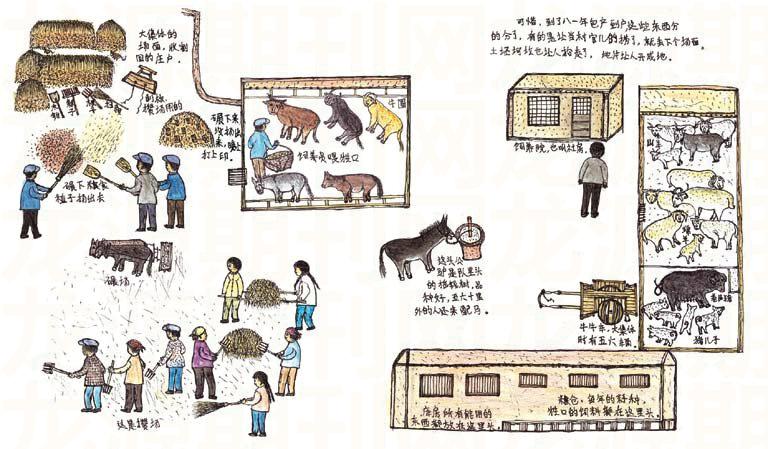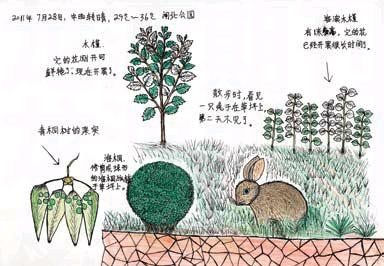Listening to the Sound of Silence
2015-06-16
Lu Yonglin [son of Qin Xiuying] is my good friend. Just like my own mother, his mother can recognize fewer written characters than familiar faces of people she knows or features of various plants and animals.
Is it possible for an elderly, rural woman who can hardly read to write good essays? From an orthodox point of view, the answer is “No.” Is it possible for an elderly, rural woman who can hardly paint to draw good pictures? From an expert point of view, the answer is also “No.”
However, if we look at her work as notes on nature, she is more than capable.
Part of the point is the things she attempts to write about and draw.
Like millions of ordinary people, the author of the book spent all her life near the bottom of society. Few know or care what she has endured in her life. Just as Lu Yonglin wrote in the postscript for the book, “Few are willing to lend an ear to the sound of silence of ordinary lives.”
Of course, some frequently attempt to speak for ordinary lives. They are writers, preachers and politicians. However, they often do this more or less for their own interests. Perhaps nobody can represent a person better than himself or herself. It is better for Qin Xiuying to make her “sound of silence” heard through her “notes on nature” than by letting others speak for her.
The author of the book, Grandma Xiuying, is the mother of Lu Yonglin. Inspired by her son and daughter-in-law, she began to write and draw. Later, her sister, Qin Xiuping, also joined the effort.
The things Qin Xiuying and her sister have written and drawn are incredibly understated and simple, straightforwardly reflecting the two old rural womens lifelong relations with plants, animals, and of course, other people, as well as the changing world. Simply speaking, their work reflects interactions between ordinary individuals and the plants and animals around them.
Some of their works are objective records of nature, some reflect their feelings, and others are common knowledge of countryside life. For instance, “One growing crops should pay attention to the rubble, while one looking for a wife should pay attention to her ancestry” and“Noodles are better to eat than rice, and a hotel is a better place to stay than a relatives house.” For those in their 20s, these are just proverbs. But for those in their twilight years, these are life philosophies of the nation.
The things they drew – plants, animals, or humans – look shallow and dull at first glance, even disproportioned and plainly-colored. However, they emit a sense of postmodernism. More importantly, things they depict, such as butterflies, sparrows, cats, dogs, camels, and the men riding camels, were what they met in their lives. With the passage of time, such things are easily forgotten. But by recording them with notes, the authors revive them in memories.
Certainly, the illustrated notes taken by Grandma Xiuying and her sister re- main superficial compared to the profundity of their lives. The doodles are merely two-dimensional representations of their lives, feelings, and emotions, as well as their relations with plants, animals, and other persons. If an individuals life is an ocean, what the old sisters recorded are only waves on the surface. They have yet to innovate ways to depict vortexes and deep undercurrents. Perhaps they dont know how to depict them or whether they should be depicted.
In my opinion, they should dive deep. If they didnt find a chance to depict such vortexes and undercurrents this time, they can do so next time. From shallow to deep, theyre already on their way.
Furthermore, if more from the silent majority publish notes on nature as the Qin sisters have done, their songs of life will compose a chorus like a spring thunder rolling across the sky. Importantly, such notes about their own lives record the true history of individual lives. Even more importantly, history of individual lives can mirror the history of communities, nations, and even all of mankind, but not vice versa.
Blue Flax Sky
By Grandma Xiuying Co-published by Zhejiang Peoples Publishing House and Iron Gourd Press May 1, 2015
Grandma Xiuying is the penname of Qin Xiuying, who is also known by the screen name “Studious Grandma.” A native of Shanxi Province, she was born in 1947 and moved to the Inner Mongolia Autonomous Region. She only spent one and a half year in school. She adores every creature of Mother Nature.
Since 2011, Qin, together with her daughter-in-law, has been dedicated to taking notes on everything about her hometown – the crops she grew, the Yinshan Mountains, and the Yellow River – with both words and drawings. They completed nearly 200 such illustrated notes. In the process, Qin learned how to write and use a computer. She even registered her own Weibo (Chinas Twitter-like microblogging service) account with the handle “Dwelling by the River.” Her illustrated notes have been published in several Chinese newspapers and magazines. In 2014, an exhibition of her work was held at Foshan Library in Guangdong Province.
Blue Flax Sky is a collection of her illustrated notes, which primarily depict common traits of countryside life like donkeys, chickens, wheat, flax, sugar beets, and melons. Combining vivid drawings and words, these notes reflect an old countrywomans respect for nature alongside the ecological and social transformations in Chinas countryside over the past six decades.
Her daughter-in-law, Rui Dongli, is the author of Notes on Nature. “My mother-in-law always writes and draws slowly but carefully,”Rui remarks. “Due to her careful drawing and coloring, her work emits a unique ambience of peace and calm. One of her notes depicts white poplars in her hometown. She carefully drew every long tomentose of each poplar. Under her brush, these woolly inflorescences seem to have the warmth of a soft, beating heart.”